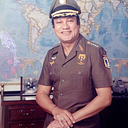“Speech for Resistance Day” by General Manuel Antonio Noriega (8/12/1988)
“Speech for Resistance Day” by General Manuel Antonio Noriega
August 12, 1988
For the first time in the Republic’s history, representative units of our armed forces are marching together with the Dignity Battalions, which are the people armed for survival. We have armed these people, and those weapons will not be taken back, because they belong to the people. These are the people armed for survival against aggression.
We insist: not even the largest army in the world can defend the Canal, as General Wallace Nutting used to say, as General Paul Gorman repeated, as General John Galvin stated: They cannot defend the Canal, even if they post U.S. soldiers inch by inch along the Canal from the Atlantic to the Pacific! The Canal can only be defended by those who live along its banks, by its owners, by those who gave it birth, by the Panamanian people!
And today, just as U.S. law permits the truth to be known after 10 years, we want to report that if they had not approved the Torrijos-Carter Treaties, Torrijos would have blown up the Canal. These men who are here were going to blow up the Canal. They were already in the heart of the Canal, and these men were moved to tears when they were told to halt, that the order is not to blow up the Canal, because the Canal is now Panamanian.
Yesterday we said: Respect Panama; take your hands off Panama. And we are saying it again today, in the presence of the aristocracy of talent which accompanies us in the summons toward the Second Amphictyonic Congress. We repeat: take your hands off Panama.
They have wanted to impose on us a democracy, patented “Made in USA”. With what right do they demand a democracy, when they wish to deny us the right to have an independent, free, and sovereign nation-without which democracy is not possible? Because without a fatherland, no political system is viable. The nation comes first. The territory, the single flag, and sovereignty are what permits the selection of a democracy reflecting the image and profile of the people.
Noriega is not the problem. Noriega did not exist in 1968 and in 1970, when Torrijos faced the empire. Nor did Torrijos exist in 1952 and 1955, when General Remón Cantera faced the empire.
The problem is a people, and this people is called Panama. So forget about Noriega. Perhaps Noriega is the last “nice guy” left. If not, ask Major José Hilario Trujillo and Major Luis Córdoba. It is preferable, then, that you put up with Noriega.
Democracy can no longer exist here without including the peasant who works the land and the worker who works for hours in the shop or the factory, and who have equal rights to those who invest capital or who apply technology and the knowledge learned in their professions. This concept of participation is what avoids violence, the armed struggles whose example we have very nearby, in other brother countries.
Far from retreating, frightened by those who attempt to become our masters, we wish to continue being worthy of the peoples who struggle against underdevelopment and dependency.
Many Panamanians naively believed that with the new 1977 treaties, Panama and the United States were going to begin a permanent honeymoon, forgetting that for the United States, a treaty is nothing but, as Torrijos said, a useful but, ephemeral act.
That the best of treaties can only be judged at the time they are signed, and that the United States signs treaties knowing full well that it is going to violate them blatantly.
From the beginning of the Republic, the United States has intervened directly and indirectly in Panama with the objective of achieving the establishment of a government that would be docile to the interests of that power.
Several strategies are used for this purpose: popular urban insurrection, the buying of consciences, with a $100 million fund, rented rebellions, with the goal of fostering a split in the armed forces.
Today there is a new destabilization strategy, which consists of a change in the structure of personnel in charge of the Canal, in order to give authority and responsibility for command to the secretary of the Board of Directors. The Canal will be run by remote control from Washington, eliminating the authority of the administrators. Lowering the Panama Canal Commission budget, which will decrease the funds allocated for maintenance, personnel training, and probably result in a reduction of the labor force.
The purpose of this is to turn workers against the government.
Canal revenues have been transferred to aid the Contras. That’s why they refused to allow the Canal books to be examined.
I want to tell you that Washington invested more than $100 million in this war.
From here, from this land free of colonialism, I am telling the world that no soldier or dependent of the U.S. armed forces, male or female, has been killed, injured, kidnapped, or reported missing. The international community must know that throughout this entire period of crisis, the Panama Canal’s operation has not been in any way hindered or jeopardized.
You can rest assured that the next President of this country will come by legitimate consultation with the ballot boxes, and will not be imposed from the barks of the Defense Forces, nor the Union Club bar, nor Washington’s sullied air of scandals and deals.
Noriega, Manuel Antonio. “From Noriega’s Speech.” Executive Intelligence Review, vol. 15, no. 34, Aug. 1988, p. 55. larouchepub.com/eiw/public/1988/eirv15n34–19880826/index.html
